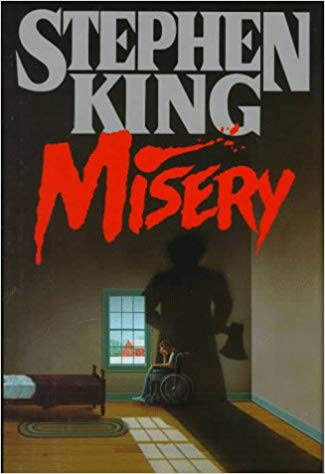
Misery was originally going to be a Bachman Book. Misery originally had a different ending. Misery is a deeply personal novel that crystallises many of the demons that Stephen King was fighting at the time of its inception. Misery is a single location novel that is never inert even when it's confined to a bed. Misery is a towering work even if it ends five inches shorter than it started.
Paul Sheldon writes "novels of two kinds, good ones and best-sellers.†After a drunken car accident in a blizzard, he is rescued by his "number one fanâ€, Annie Wilkes. But, with both of his legs broken, why isn't he in a hospital? And what will happen when Annie finds out that he has killed off her favourite best-selling protagonist, Misery Chastain?
Misery is about a somewhat alcoholic author who develops a new addiction to painkillers and tries to sublimate it with an addiction that he can at least justify as productive: writing. As with much of King's 1980s output, it is difficult not to read autobiographical elements into it. When the substance abuse is literal, the allegory is easy to find. Combine that with King's legion of super fans, and their reaction to Eyes of the Dragon, and Misery works on multiple levels.
Misery may be one of King's more collective consciously absorbed works, through both novel and film incarnations, but here comes the spoiler warning regardless. You can't talk about Misery in a modern context without considering two parts of its history: it was a Bachman Book and it had a much darker ending. The Bachman thing didn't happen because Bachman's true identity was prematurely revealed; King feels that if Misery had been published under the Bachman banner, Bachman would have become a major writer in his own right.
Certainly, of the Bachman Books covered under the Constant Reader Chronicle tag to date (only Thinner is as yet unread in the cycle before Bachman's initial perishing), Misery would be far and away the strongest. But Misery does not read like the work of a man who has had only four novels of lukewarm reception, or of someone who merely dreams of publishing megastardom; Misery is the immediate work of a man who has been there.
Bachman's Misery would have seemed disingenuous, but we can accept this published version from the mind of Stephen King. In On Writing, King talks about ending Misery with Annie winning, feeding Paul to the porcine version of Misery, and binding Misery Returns in his skin. As he said there, it may have worked in short story form, but to spend time with Paul — every inch of him, the hopeful and the depraved — and then have him murdered would come across not as dramatically satisfying or ironic, but cruel. It might have been appropriate, even expected, from the pen of Bachman, yet King simply couldn't get away with it. Misery, as it stands, is just about as near to perfection as King gets.
Confined to a single house, and largely to a single room, Misery is literally a tightly contained piece. Paul's claustrophobia is not our own, nor is his discomfort. King's work is empathetic, but he saves the blue sky at Paul's window for us. We worry on Paul's behalf, but his problems are not our own, and it takes some time to soften his edges: he is something of a self-important blowhard to begin with, although Annie's treatment of him is never justified.
Paul, it must be said, is something of a hack. Even when he is writing the demented new continuation of Misery's adventures, Misery's Return, reborn as a gothic adventure into Darkest Africa, it is difficult to take it seriously. By 1987, King may have been getting better about magical negroes and the "dialect†that he would have them speak, but Paul Sheldon has no such qualms. As Misery's Return grows more obscure and delirious, its vividly realised and cheerfully insane plot drip fed to us through the passage of days broken up only by Annie's increasingly disturbed episodes, Paul brings himself back to life. You might have to be a different brand of Constant Reader to be able to stomach an entire novel about Misery Chastain, but that is beside the point: the question is not can we, but can Paul?
Annie Wilkes herself is one of King's finest creations. She is, undeniably, a monster. Any sympathy we feel for her is tempered through the knowledge of what she has done and what she intends doing. When we learn her dark secrets, there is no inciting incident that made her the way she is. As she always was, as she ever will be. Annie's banality means we can understand her, and know almost every part of her, and that is what makes her so frightful. Lonely women don't imprison and enslave their idols, or at least most don't, but Annie is so much more than that.
King would famously go on to have his own catastrophic car accident that nearly killed him, and nearly cost him his leg. We cannot lend Misery the air of prophecy, and King was lucky to have Tabitha rather than Annie Wilkes to help nurse him back to health, but we can recognise in both Paul and King's lives the redemptive power of storytelling. King nearly retired after his fateful accident, but he realised that the wheel of ka had greater plans for him, and the Dark Tower cycle was at last completed.
Misery is the work of a man with a deep well of self-awareness, still trying to raise himself from the hole that more than a decade of substance abuse and outsize success had plunged him into. It is tightly plotted, frequently disquieting, but generous even in its confinement. Total sobriety was still five books away for Stephen King, but in Misery heacknowledges that the Constant Reader should not abandon all hope of redemption for him. 32 years later, his tale is still being told.

